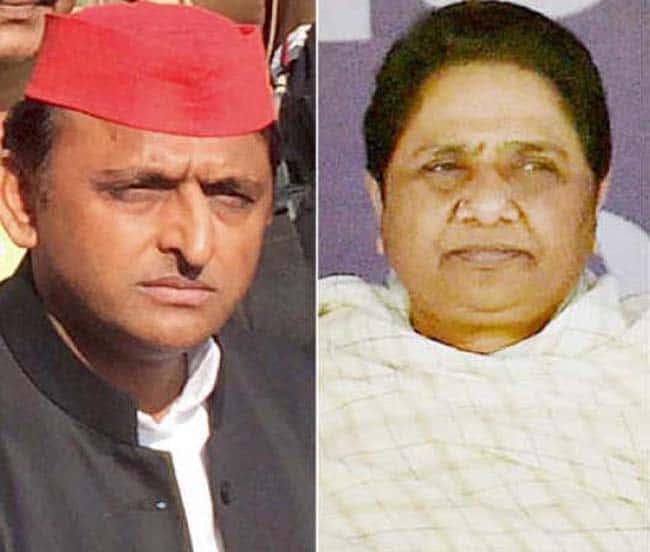New Delhi: The shocking defeat of the BJP in Gorakhpur and Phulpur parliamentary bypolls has raised the morale of the opposition parties, set a successful template for them for the 2019 Lok Sabha polls and sent out a message that the BJP will not find the going easy in crucial Assembly polls in four major states this year.
The Samajwadi Party’s triumph in Gorakhpur and Phulpur as also Rashtriya Janata Dal’s retention of the Araria Lok Sabha seat in Bihar has led to demands for a Grand Alliance of opposition parties to defeat the Bharatiya Janata Party in the next General Elections.
The results of the by-elections in Uttar Pradesh are significant as they came almost a year after the BJP’s unprecedented victory in the state Assembly polls. The two Lok Sabha seats were held by present Chief Minister Yogi Adityanath (Gorakhpur), and his deputy Keshav Prasad Maurya (Phulpur).
The BJP had won the two seats in 2014 by big margins of over three lakh votes. The failure to retain the two seats has again showed the BJP’s vulnerability in a contest against a combined and determined opposition.
The BJP had been defeated by the Grand Alliance of Janata Dal-United, RJD and Congress in Bihar in 2015 Assembly elections despite aggressive campaigning by Prime Minister Narendra Modi.
If the Congress — like the Bahujan Samaj Party — had not put up its candidates in Phulpur and Gorakhpur and instead decided to support SP nominees, the victory margin of the winning candidates would have been bigger.
Any alliance between the three parties in Uttar Pradesh for the 2019 Lok Sabha elections will make the going extremely difficult for the BJP and impair its chances of returning to power at the Centre. The state has 80 Lok Sabha seats and the BJP had won 71 of these on its own in 2014, with its ally bagging another two.
The poll verdict in Phulpur and Gorakhpur also showed a remarkable transfer of votes at a relatively short notice and has a lesson for the opposition parties.
The Bahujan Samaj Party had announced its support for SP candidates only about a week before the polling after the BJP triumph in Tripura Assembly elections and its improved performance in Nagaland and Meghalaya. The BSP, with its disciplined and dedicated workers, was particularly effective in the task.
The results in Gorakhpur and Phulpur will have ramifications for national politics, with the opposition parties now expected to step up efforts to forge an electoral alliance against the BJP for 2019.
United Progressive Alliance Chairperson Sonia Gandhi has been holding meetings of like-minded opposition parties to discuss ways to take on the Modi government. Some senior leaders, including Sharad Pawar and Mamata Banerjee, are also expected to make renewed efforts to emerge as the pivot of opposition unity.
Telangana Rashtra Samithi leader and Telangana Chief Minister K. Chandrashekar Rao has pitched for the formation of a Third Front opposed to both the BJP and the Congress.
The shocking defeats have come at a time when BJP is facing trouble from its allies. The TDP has withdrawn its two Ministers from the Modi government over its demand for special category status to Andhra Pradesh.
Shiv Sena is becoming increasingly assertive and its MPs have also protested in Parliament when the government faced disruptions from the opposition.
The BJP-led government is also under sustained attack from the Congress and other opposition parties on a range of issues, including Rs 12,600 crore PNB bank fraud and its adversaries are likely to step up their attack in the coming days.
The results of by-elections have taken some sheen off the BJP’s electoral performance in the northeast earlier this month.
The by-election results have shown that the BJP has to contend with diminishing returns in the Hindi heartland states which were crucial to its success in the 2014 polls.
Apart from its stunning success in Uttar Pradesh in 2014, the BJP had swept states such as Rajasthan, Gujarat, and Himachal Pradesh.
The BJP’s tally in the Lok Sabha has come down to 274 now from 282 in 2014.
But the opposition has its set of challenges in coming together against the BJP. It entails fighting far less number of seats, curbing ambitions and conceding space to parties who were rivals not long ago.
The ruling party in each state is keen to fight all or maximum number of seats and any alliance will entail hard negotiations.
There is also the question of putting up a prime ministerial candidate against Narendra Modi with Congress keen on Rahul Gandhi. The opposition parties are expected to wait for assembly elections this year in Karnataka, Rajasthan, Madhya Pradesh and Chhattisgarh before taking a call on the issue.
IANS

